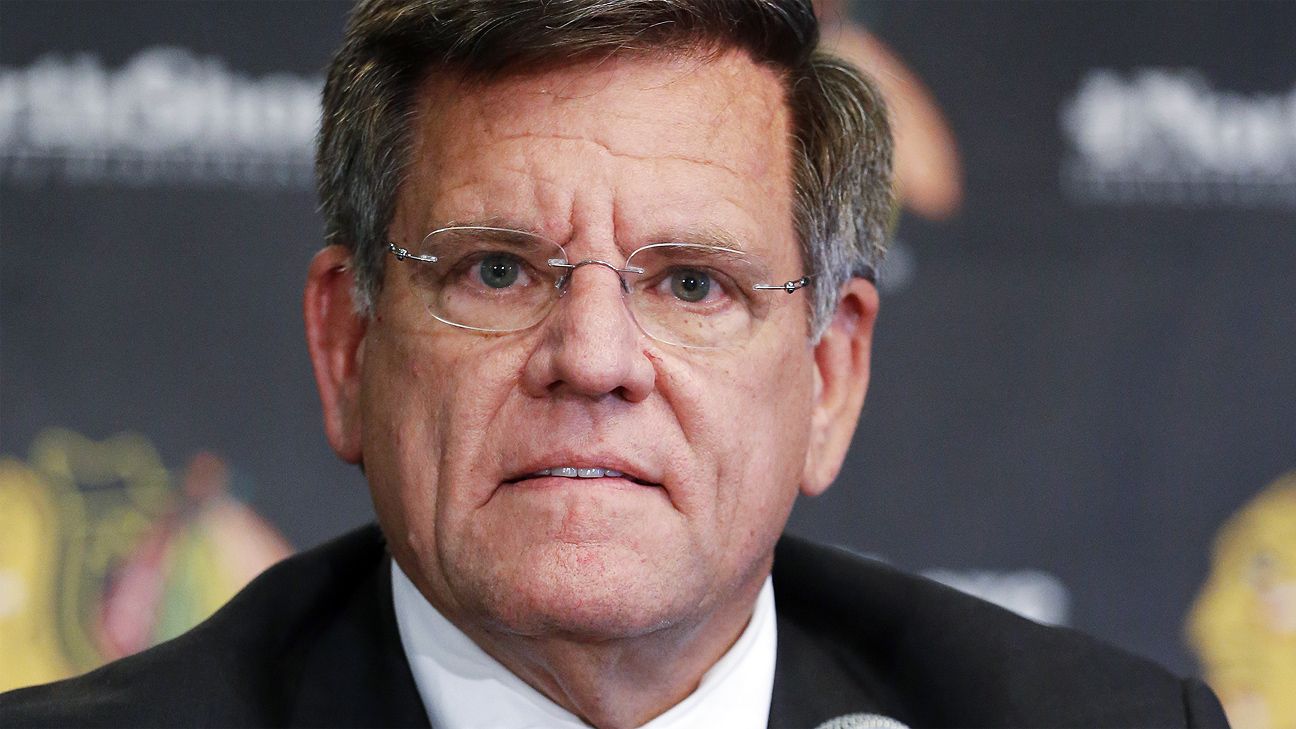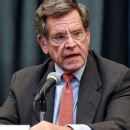
NHL commissioner Gary Bettman on Friday defended the comments made earlier this week by Chicago Blackhawks owner and chairman Rocky Wirtz on his organization’s response to the Kyle Beach lawsuit.
Wirtz gave a confrontational answer to a reporter who asked about how the Blackhawks planned to avoid power imbalances in the future on Wednesday, calling the question “out of line.”
In an appearance Friday on The Point, Bettman spoke for the first time about Wirtz’s angry response to questions about Beach.
“What we saw from Rocky was frustration,” Bettman said. “[It was] an emotional — I think most media are calling it an outburst — and the most unfortunate thing about it is, it’s completely inconsistent with all the work that the Blackhawks are doing. A lot of personnel have left. [President of Business Operations] Jaime Faulkner and [CEO] Danny Wirtz are really running things day-to-day. They are bringing in a wellness department, they’re having training, there’s counseling, they know they have to do everything right to create an environment that has an open, welcoming and safe culture. And that’s what they’re working on.
“So I just think it was an emotional moment born out of something that I know has weighed very heavily on Rocky and I think [at] the town hall and what he was really focused on was, how do we take all these things we’re doing to move forward? And I just think this was just pent-up frustration. And he apologized promptly.”
1 Related
Reporters questioned Wirtz and an assembled panel at Chicago’s town hall on Wednesday about how the Blackhawks planned to avoid power imbalances between players and coaches in the future, like the one Beach endured in 2010 at the hands of then-video coach Brad Aldrich.
An independent investigation by the law firm Jenner & Block concluded that “nothing was done” by senior leaders to prevent the harassment Beach faced, and longtime general manager Stan Bowman and vice president of hockey operations Al MacIsaac both resigned while others were fired because of what Jenner & Block unearthed.
“We’re not going to talk about the report [on Beach],” Wirtz said on Wednesday. “We read it. We’re moving on. I think you’re out of line. I don’t like your questions. What we’re going to do today is our business. I don’t think it’s any of your business. You don’t work for the company. If someone in the company asked that question, we’ll answer it, and I think you should get on to the next subject. We’re not going to talk about Kyle Beach. We’re not going to talk about anything that happened.”
Wirtz released a statement late Wednesday night expressing “regret” over his reaction to the inquiry.
Bettman, who is in Las Vegas for the NHL’s annual All-Star Weekend, also touched on the Arizona Coyotes’ arena issues. The Coyotes are in the last year of their lease at Gila River Arena and have yet to secure a permanent new home. They are currently working out a multiyear deal to play at Arizona State University’s still-unfinished 5,000-seat venue, which would be by far the smallest capacity arena in the NHL.
“It’s not a permanent solution,” Bettman said. “As long as it’s only temporary, I think fans can have a lot of fun with it. [Coyotes owner] Alex Meruelo is committed to getting a new arena. He’s very focused on [building one in] Tempe, which is the right place for the arena to be. And since [the city of] Glendale decided, because he wouldn’t sign a 20-year lease [in their venue], that they weren’t going to renew his lease beyond this year, and the Phoenix Suns aren’t cooperating because they don’t want them playing in their building because I assume they’d like to get them out of town, this is what we’re confronted with.
“But the opportunity, particularly with the possibility of a new arena in Tempe, really will solidify that market, which is a good hockey market, just ask [Scottsdale native] Auston Matthews. So sometimes you have to look at the long term and not look at the short term. And think about the 5,000 people, the type of intimate experience they are going to have.”
The city of Glendale broke off negotiations on a multiyear lease extension at the Gila River Arena in August 2021 and declared that the 2021-22 season will be the team’s last in the building. Bettman said that if the Coyotes play at ASU, it wouldn’t impact their revenue sharing because they’re already at the maximum.
In fact, the NHL believes there’s a chance the move to a smaller venue could be financially advantageous for the franchise.
“This will tell you why it is they need a new arena: We’re not sure there’s going to be a material difference between their revenues at ASU and in Glendale. In fact, under one projection that we’ve done, we think they may do better,” Bettman said.
Bettman also addressed COVID-19 restrictions in Canada, saying the league’s Canadian clubs are discouraged with having to limit their fan capacity to 50% in some cases and to zero fans in others.
“This is very frustrating for everybody,” he said. “Not surprisingly, a number of the Canadian clubs have asked about the possibility of playing their games somewhere else. That’s how troublesome it’s been. That’s not what anyone wants to do and not something that we’re actively encouraging.”
Bettman said the NHL plans to conduct the 2022 NHL draft at Bell Centre in Montreal on July 7-8, but indicated that could change if the current COVID-19 restrictions are still in place in Canada.
“Not only could we not have fans, we couldn’t have all the personnel we’d need to conduct the draft,” Bettman said.
He said there haven’t been any formal talks about pulling the draft from Bell Centre, and was hopeful restrictions are lifted before that would become necessary. Deputy commissioner Bill Daly said the draft would “have to go virtual” if it wasn’t held at Bell Centre.
“No,” interjected Bettman, “I think we might go somewhere else.”
In other news, the NHL and NHLPA met last week regarding the next World Cup of Hockey tournament and hope to hold the next edition of the “best on best” event before the 2026 Winter Olympics.
The World Cup of Hockey was resurrected in 2016. It featured six countries — host Canada, the U.S., Czech Republic, Finland, Sweden and Russia — along with two new teams: Team North America, which was populated by 23-and-under players; and Team Europe, which had players from European countries not already represented in the tournament.
Daly said the event “might look a lot different than the one in 2016,” but offered no details on what those changes could look like.

